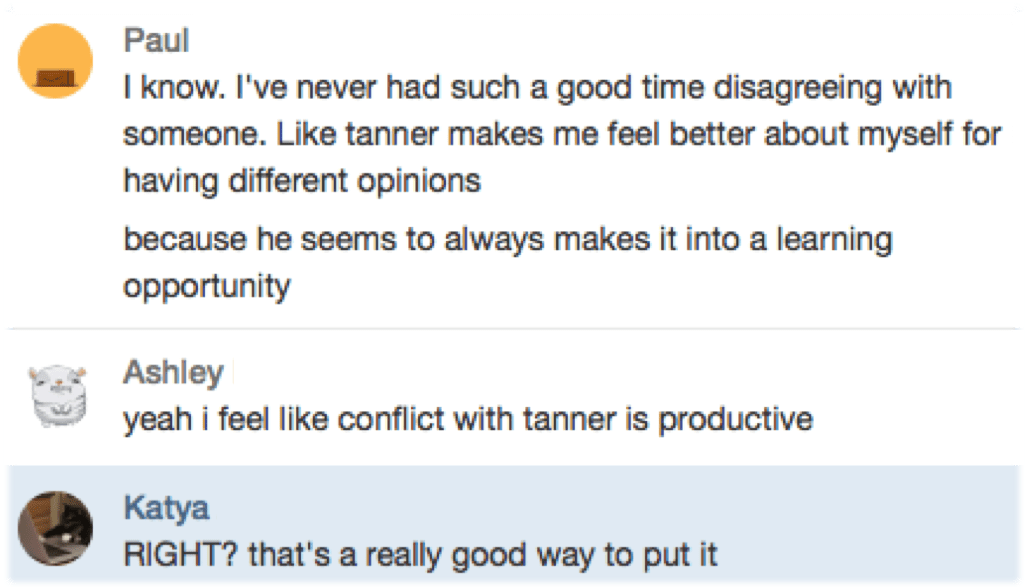I’m difficult but with purpose.
I’ve said this about myself on numerous occasions, and I’m sure many of the bosses I’ve had over the years had a hell of a time managing me. Then again, like Grace Hopper said:
You manage things. You lead people.
And it’s not that I’m trying to be difficult. I just enjoy debate. No, that’s not right. I enjoy understanding what makes others tick, and that can be more easily explored where we disagree. I believe it’s this mindset that’s helped me with navigating conflict.
In fact, it reminds me of the highest praise I’ve received as a coach. A few years ago, three team members were talking privately, and I came up. One of them later shared with me the screenshot you see here. My wish is that all of us receive this kind of feedback at some point in our careers.

Be Right Or Be Happy
But how? How can we make conflict a positive experience? It starts here:
If you’re looking to be right, you’re not there yet.
We should put aside the notion of right or wrong. Walk into the conversation prepared to appreciate the other’s perspective, and in turn, we’ll usually find they’re open to hearing our own. As the saying goes, listen to be heard. Or maybe this tongue in cheek marriage advice sums it up:
You can be right. Or you can be happy. Choose wisely.
However, this also requires us to possess the emotional intelligence to appreciate our own state of mind. If we’re still amped up by whatever occurred, it’s wise to postpone the conversation by a few hours or to the next day. Just don’t wait too long.
Questions Over Statements
I should stop giving this advice. It feels as if I touch on this idea in every other post, but it’s relevant in so many situations. Have you ever assumed the worst of someone else, leaned into them, and then left the conversation with your foot firmly in your mouth? Tell me I’m not alone. Please. Questions help us avoid this pitfall, and they ensure we maintain a bias toward innocence. Remember though:
Questions should come from a place of curiosity and never be a condescending game of trivial pursuit.
Want to practice this technique? Try this. Next time you have a conversation, try asking nothing but questions. With every thought that comes to mind, find a way to transform it into a question. I remember mentoring someone some time ago, and I asked him if it was possible to have a conversation with nothing but questions. He didn’t believe so, and he maintained this position as I peppered him with questions for five minutes. On the sixth minute, the reality dawned on him that I’d done nothing but ask him questions for the entirety of the conversation.
It’s Not You, It’s Me
We should pick our pronouns carefully. When we give praise, we should mostly use inclusive language. We. Our. Us. However, when it’s time for a tough conversation, shift to first person:
- “I’m worried that…”
- “I was expecting that…”
- “It bothered me that…”
We shouldn’t feel qualified to speak for others so make the conversation about the two people in the room. We should make it clear how we feel and how the situation personally impacted us. Also, put away blame. I’ve found there’s usually enough of that to go around, and it wouldn’t be a weekday if I didn’t muck something up.
Finally, before we go, I’ll give one last piece of advice for navigating conflict. These kinds of things don’t have to be awkward, and there’s a straight forward way to dodge that queasiness associated with difficult conversations, and it’s this:
Enter the conversation to understand, not to argue.
It’s not about winning. Or being right. It’s also not about ensuring whatever occurred never happens again. It’s about understanding someone a bit more than we did yesterday, and that’s never awkward, right?
Until next time.
Do you want to get notified when new posts are published? Leave your email below.






Tanner, what a powerful post! I do want to believe that conversations about conflict don’t need to be awkward. Though I know I have felt that way. Do you have any insights for when you are trying to help with a conflict between 2 team members that can’t seem to get past it?
Thanks, Vic. I think it starts with understanding why. Why can’t get they get past it? Are they so busy preparing their response that they’re not truly listening to the other person? If so, how can you get them to rephrase what the other person says to ensure they properly understood? Do they even realize there’s conflict between them? Has this been communicated explicitly with them and do they realize how their conflict impacts you? How have other team members broached the subject with them? Have you explored moving one of them to another team to see what happens next? I’d say such an approach is a last resort since I prefer sorting it out over changing the circumstance, whenever possible. I realize I have more questions than answers, but I do have one fear. People tend to avoid conflict rather than talk about it, and it then festers. I’ve found being transparent, talking through how their behaviors have affected me as a coach, and then letting the conversation unfold as we figure out what to do about it together.